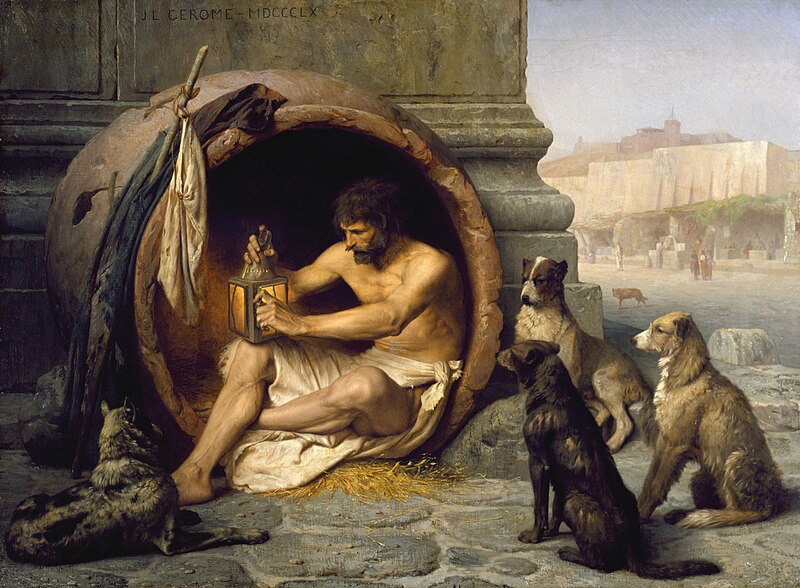
Today we take a break from the historical Jesus and focus just on the
Gospel narratives for a Passion Week-themed entry on the Jesus Blog. In Mark 15:34 and Matt 27:46, the Gospel narratives
portray Jesus as yelling from the cross, "My God, my God, why have you
forsaken me?" I wrote my MA thesis
on this verse in Mark many moons ago and have always found it interesting. In my experience, preachers love to preach
this verse because it makes for good pulpit drama, God abandoning his own son
and whatnot. I also think people tend to
read Paul's statement that "God made him who knew no sin to be sin"
(2 Cor 5:21) onto the Gospels here and say, "Ah, see, that's when he did
it." But we can't read Paul onto
Mark or Matthew and the sinlessness of Jesus is not a prominent theme in Mark
and Matthew at all, certainly not like it is for Paul or Hebrews (4:15) or some
of the Johannine literature (Jesus as the "lamb" in the Gospel and
Revelation, or 1 John 3:5) or the church fathers. I'm also not concerned here with the
theological implications of God's potential abandonment of Jesus. There are other blogs dedicated to such
topics.
I'd rather like to ask whether, on the level of the Gospel narrative,
Mark and Matthew actually intend to claim that God did, in fact,
"forsake" Jesus. One can read
the narrative in such a way as to support either claim. For those scholars who see Mark 15:34 as a
divine rejection of Jesus, they think this is the climax of Mark's dark and
somber description of Jesus' demise. Judas
abandons Jesus when he betrays him (Mark 14:10), the disciples fail him in
Gethsemane and abandon him (Mark 14:50), the naked young man abandons him (14:52),
the Jewish leaders reject him in his
trial, Peter denies him (Mark 14:66-72), the priests and crowd reject him in
favor of Barabbas (15:11) and now, God himself abandons Jesus. Jesus thus dies as utterly and totally
abandoned.
For those scholars who see Mark 15:34 as pointing to something more
positive, however, the narrative can be read otherwise and as the climax of
Jesus' distinct commitment to follow God in the midst of others' inability or
unwillingness to follow. Judas betrays
Jesus, but Jesus presses on with the last supper, during which he states again
his knowledge of how this will all end (Mark 14:17-20). The disciples and the naked young man abandon
Jesus in Gethsemane, but in the same location he commits himself all the more
to God's will (Mark 14:36). The Jewish
leaders reject Jesus in his trial, but he affirms his identity as the Son of
Man sitting at the right hand of God (14:62).
Peter denies Jesus, but Jesus fails to deny being the king of the Jews
before Pilate (15:2). (The translation of this verse as "Yes, it is as you
say" or some equivalent is a travesty because it doesn't preserve the
ambiguity of Jesus' answer in the Greek, which is literally "You
say." The point at present is that he doesn't say "no.") In other words, from this perspective, Jesus
becomes more and more committed to following a path he claims is God's will and
foreshadowed in Scripture while others consistently fall off that path.
This brings us back to Mark 15:34, which is the next thing that Jesus
says in Mark's Gospel after he answers Pilate.
As almost all scholars of the Gospels know and many lay readers of the
Gospels do not (though some do), what Jesus says in Mark 15:34//Matt 27:46 is a
verbatim quotation of Psalm 22:1 (Psalm 21 in the LXX). (Check out
this
interesting post on the pronunciation of the Aramaic with some observations
about the Greek transliteration.) This
is important because Psalm 22 is a lament psalm where the psalmist concentrates
alternately on either his seeming abandonment by God to his enemies or his
conviction that God can deliver him now in light of his deliverance of other
Israelites in the past. The downswings
focused upon his present circumstances eventually give way to a triumphant
finish to the psalm where the psalmist expresses his conviction that, despite
how things look right now, he will praise the Lord (22:22-23, 25), who has, in
fact,
not abandoned him (22:24) and
is working a great deed that will bring about the worship of all the earth
(22:27).
The pertinent question here is whether Mark and Matthew desire us to
read Mark 15:34//Matt 27:46 in light of all of Psalm 22 or just the bleakness
of its opening verse. If the former, the
verse would be the ultimate expression of Jesus' commitment to the
Lord despite the causes for despair that surround him. If the latter, the verse indicates the final abandonment in a series of preceding abandonments.
There has been some considerable debate over whether, for Jews in the
time of Jesus, citation of the first verse of a psalm automatically indicated
the rest of the psalm. We intuitively
know how this works from our own experience.
When I hear "Turn it up..." I automatically grow sideburns, a
Justin Boots hat appears on my head, and a cold MGD appears in my hand. I'm immediately ready to tell everyone that I
hope Neil Young will remember that a southern man don't need him around . . . anyhow. When Anthony Le Donne hears, "Yo fellas,
y'all ready to do this?" his glasses become flip-ups and he's immediately
ready to tell everybody that Motown Philly's back again. And James Crossley is an undefeated pub quiz
champion when it comes to identifying professional wrestlers based on just the
first parts of their entrance music.
He's a particular fan of Steve Austin's shattering glass, which is also
his ringtone.
But was this common practice for first-century Jews? It's clear that this happened sometimes, but
not necessarily every time. So it doesn't
exactly solve the problem for us. I
don't think it needs to, though. I think
that Mark and Matthew do want us to
understand Jesus' citation of Psalm 22:1 in the context of the broader psalm
precisely because they contain several other allusions from the psalm. (I'll focus just on Mark.) The soldiers' casting lots for Jesus'
garments in Mark 15:24 is definitely from Psalm 22:18. The reference to the mockers "wagging
the head" in Mark 15:29 is definitely from Psalm 22:7. The taunt to save in Mark 15:30-31 is
possibly an allusion to Psalm 22:8. The
"despise" or "reproach" of the two co-crucifieds in Mark
15:32 is possibly an allusion to Psalm 22:6.
The confession of a Gentile in Mark 15:39 is possibly an allusion to
God's acknowledgment by Gentiles in Psalm 22:27. The reference to the
"kingdom/dominion" in Mark 15:43 is possibly an allusion to the
"kingdom/dominion" of the Lord in Psalm 22:28. The crucifixion of Jesus in general is possibly an allusion to Psalm 22:16. Some of these are more possible than others,
but at least three (Mark 15:24//Psalm 22:18; Mark 15:29//Psalm 22:7; and
Mark 15:34//Psalm 22:1) are certain.

For these reasons, I think it's more likely that the author wants his
audience to understand Jesus' citation of Psalm 22:1 in light of more than just
that verse of the psalm. Let me say it
another way. The author's memory of
Jesus' death has been conflated with Psalm 22 in several places. Thus, when the narrative is read this way, Jesus' statement, far
from communicating God's abandonment, communicates something along the
lines of, "It looks really bad right now. It looks like I've been abandoned. It looks like my enemies have won. But in reality this is what God's deliverance and establishment of his kingdom look like." In my mind, this makes
more sense of the broader narrative of Mark's Gospel.
If you're interested in reading further on this topic, see Holly J.
Carey's monograph, Jesus' Cry from the
Cross. Finally, I shouldn't pretend
that this ties up every loose end. The
best arguments against this type of reading of Mark 15:34 and Matt 27:46 are
that Luke and John both decided not to follow Mark and Matthew. They change Jesus' last words from the cross,
and scholars often think this is because they want to avoid such a negative
portrayal of Jesus, which would reveal that they did indeed think of Mark's and
Matthew's endings as negative. Of
course, this really reveals only how Luke and John read Mark and Matthew, not
necessarily what Mark and Matthew intended.
Further, it might be the case that Luke and John agreed about Psalm 22
(they repeat some of the allusions) but simply wanted to avoid any chance of
misinterpretation. Every once in a while you'll run across statements in the literature saying that those who take the perspective I have here simply don't want to face the possibility that the authors think Jesus was abandoned. Although that might be true for some, it's certainly not true for all of us. Regardless, we rarely
get entirely tied up loose ends anyway.
As it stands, though, I think there's much reason to read Mark's and Matthew's portrayals of Jesus' seeming
abandonment by God as just that . . . seeming. Thoughts?


















